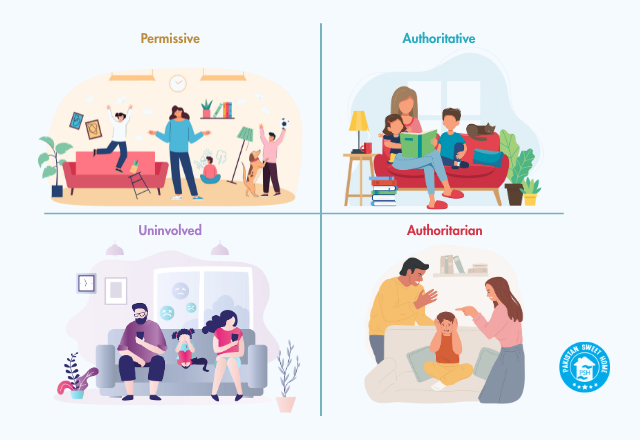Do you find yourself feeling guilty for raising your voice or losing patience with your child?
The frustration of feeling like every day is a battle can leave you drained, and questioning your approach. Despite your best efforts, it feels like you're only getting further from the calm and respectful relationship you desire.
Gentle parenting offers a refreshing approach that fosters respect, communication, and a deeper connection with your child.
Let’s explore what is gentle parenting, its pillars, myths, methods, examples, and benefits.
What is Gentle Parenting?
Gentle parenting is a nurturing approach that fosters collaboration between you and your child. It emphasizes choices guided by internal motivation rather than external pressures. It urges mindful modeling of behavior, fostering compassion, honoring emotions, and respecting children as capable individuals.
This approach isn’t bound by rigid rules or influenced by trends from parenting gurus or celebrity lifestyles. Instead, it offers a flexible philosophy with strategies that may already feel familiar.
Parenting expert Sarah Ockwell-Smith (author of The Gentle Parenting Book) summarizes gentle parenting as empathy, understanding, and respect.
Pillars of Gentle Parenting
Gentle parenting is about embracing intuitive truths:
- Children learn by observing their parents
- They deserve to be valued for who they are
- They thrive when empathy, understanding, and respect guide their upbringing
Empathy
Empathy involves being present and mindful of your child’s emotions, especially in moments of need. Instead of reacting automatically, pause to understand the reasons behind their behavior.
For instance, when a child is upset, explore their feelings and needs with curiosity. This approach not only addresses the situation but also teaches compassion by example.
Understanding
Recognizing that children view the world differently is key. They lack the emotional and cognitive maturity of adults.
When a child reacts strongly to small disappointments, like losing a toy or leaving the park, remember this is normal. Such responses are typical for their stage of development. This understanding fosters a safe space for emotional growth.
Respect
Mutual respect is at the core of gentle parenting. Treating children with respect models the values parents hope to instill in them. Instead of issuing harsh commands, use kind requests and encourage collaboration. This approach nurtures a respectful and value-driven mindset in children.
Myths About Gentle Parenting
Gentle parenting is often misunderstood, leading to a range of misconceptions. Here are three of the most common myths and the truth behind them:
1: Overly Permissive and Hands-off
Contrary to popular belief, gentle parenting doesn’t mean allowing children to do as they please without limits. Instead, it focuses on setting clear, firm boundaries with empathy and offering positive guidance.
This approach focuses on explaining rules clearly to children. It helps them understand expectations and reasons.
2: Ineffective for Strong-Willed Children
Gentle parenting can be particularly effective for strong-willed children. By addressing their emotions and providing choices, this method helps them recognize, process, and constructively manage their intense feelings.
3: All About Being Happy and Patient All the Time
Parenting is challenging, and even gentle parents experience frustration and confusion. The core of gentle parenting is building a strong emotional connection. This helps navigate tough moments effectively without aiming for perfection.
While gentle parenting is a popular approach, it’s not the only effective style. Authoritative parenting has been widely studied and shown to benefit children
Recent discussions have also raised concerns about gentle parenting. Preliminary research by Annie Pezalla (2023) highlights that this style can leave parents feeling emotionally drained and uncertain.
Pezalla and Alice Davidson’s study shows many gentle parents react to their strict upbringing, avoiding repetition.
Gentle Parenting Methods
Gentle parenting integrates aspects of various positive parenting philosophies, including positive discipline, attachment parenting, and Montessori methods.
Each parenting style has unique principles. Gentle parenting combines key elements to form an adaptable approach.
1. Positive Discipline
Developed by Jane Nelsen (2012), positive discipline emphasizes building rapport, encouraging positive behaviors, solving problems collaboratively, and teaching life skills.
Here’s how to practice it:
- Set clear expectations
- Use positive reinforcement
- Provide logical consequences
- Model good behavior
- Encourage problem-solving
- Choose time-in over time-out
- Stay calm
- Offer choices
- Be consistent
- Practice active listening
These strategies nurture mutual respect while instilling essential values and life skills.
2. Attachment Parenting
Rooted in attachment theory, this approach emphasizes building a secure bond by addressing emotional needs, particularly during early childhood.
Key practices include:
- Responsive caregiving
- Babywearing
- Breastfeeding
- Co-sleeping
- Emotional availability
- Baby-led weaning
- Positive touch
- Limited separation
- Support independence
Attachment parenting shares similarities with the gentle parenting model. However, it focuses more on the early bond.
3. Montessori Education
Montessori parenting fosters independence, respect, and curiosity through hands-on learning in a prepared environment.
You can incorporate Montessori principles at home by:
- Creating a prepared environment
- Following your child’s interests
- Encouraging independence
- Using hands-on materials
- Promoting life skills
- Focusing on process over product
- Providing freedom within limits
- Exploring nature
- Fostering a love for learning
- Acting as a facilitator
By adopting these principles, you foster a nurturing and stimulating environment for your child.
Real-Life Examples of Gentle Parenting
Here are some everyday situations that demonstrate how a gentle parenting approach can be applied effectively.
1. Managing a Toy Store Tantrum
Instead of yelling, calmly kneel at your child's eye level and acknowledge their feelings:
"I see you're upset because you want that toy. It looks fun, doesn’t it?"
Then, explain the reason behind the decision and offer a positive alternative:
"That toy is out of our budget right now, but how about we pick a puzzle or a book together instead?"
2. Tackling Morning Rush Arguments
Help your children communicate their feelings during the hectic morning routine. Begin by validating their emotions:
"I understand you're upset about having to wear this jacket. It’s not your favorite, I know."
Then, work together on a solution that respects both their feelings and your schedule:
"How about we pick your favorite shoes to go with the jacket? That way, you’ll feel better."
3. Resolving Homework Frustration
Help your child approach their homework calmly by empathizing with their frustration:
"I see you’re feeling frustrated with this math problem. It can be tough sometimes."
Then, encourage them to take a break or ask for help when needed:
“Good job! Now, would you like to take a quick break and come back to it, or should we work on it together?”
Provide reassurance:
"It’s okay to ask for help. I’m here to support you."
Benefits of Gentle Parenting
Gentle parenting offers a wide range of advantages.
According to Sullivan,
"Gentle parenting teaches children to actively engage with the world, set personal boundaries, trust their instincts, and express themselves. It provides a framework for children to assert themselves clearly and respectfully, reducing their vulnerability to bullying."
Additional benefits of gentle parenting philosophy include:
- Reduced Anxiety: Gentle parenting may reduce anxiety, helping shy toddlers respond better in social settings.
- Stronger Parent-Child Bond: It enhances the bond between parents and children through love, time, and support.
- Positive Social Skills: Children mirror respectful behavior, becoming more empathetic and respectful as they grow.
In summary, gentle parenting fosters emotional growth, independence, and mutual respect between parents and children. By practicing empathy, understanding, and respect, parents create a nurturing environment for their child's development.
The approach encourages collaboration, clear boundaries, and positive reinforcement while addressing emotional needs. Gentle parenting can be effective for both strong-willed and sensitive children. Incorporating methods like positive discipline, attachment parenting, and Montessori can further enhance this nurturing philosophy.
Ultimately, gentle parenting strengthens the parent-child bond, reduces anxiety, and creates long-term supportive relationships.
Similarly, at Pakistan Sweet Home, the concept of homes for orphans aligns closely with the principles of gentle parenting. By providing a safe, supportive, and loving environment for children who have lost their families, PSH ensures that every child has the opportunity to grow emotionally and develop the independence they need to thrive.
Help Orphans Build a Better Tomorrow

info@pakistansweethome.org.pk
(051) 4865856
+92 335 1118477













